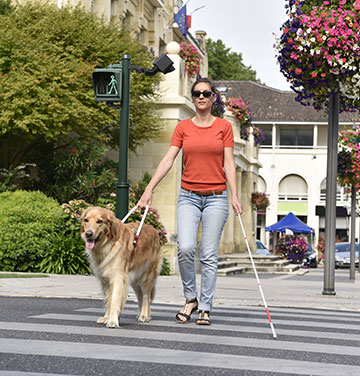¿Las percepciones importan?
Página 4: La representación en el cine y la literatura
 De una forma u otra, en un momento dado, los medios audiovisuales han influido en la manera en que vemos el mundo que nos rodea, y las discapacidades no son una excepción. Ya sea a través de películas populares, programas de televisión o literatura, millones de personas son expuestas a representaciones de personas con discapacidades como autismo, ceguera y discapacidades intelectuales por medio del lente de los medios audiovisuales. Sin embargo, si la intención principal de una película o novela es entretener, ¿cuán probable es que esa representación de la discapacidad sea precisa? ¿O que la precisión de la representación haya sido sacrificada por un mejor relato o narración? ¿Y qué de nosotros como espectadores o lectores? Si no conocemos a una persona con la discapacidad representada, ¿con qué frecuencia acontecerá que nuestras percepciones estén basadas en lo que bien podrían ser representaciones erróneas, discriminatorias e injustas?
De una forma u otra, en un momento dado, los medios audiovisuales han influido en la manera en que vemos el mundo que nos rodea, y las discapacidades no son una excepción. Ya sea a través de películas populares, programas de televisión o literatura, millones de personas son expuestas a representaciones de personas con discapacidades como autismo, ceguera y discapacidades intelectuales por medio del lente de los medios audiovisuales. Sin embargo, si la intención principal de una película o novela es entretener, ¿cuán probable es que esa representación de la discapacidad sea precisa? ¿O que la precisión de la representación haya sido sacrificada por un mejor relato o narración? ¿Y qué de nosotros como espectadores o lectores? Si no conocemos a una persona con la discapacidad representada, ¿con qué frecuencia acontecerá que nuestras percepciones estén basadas en lo que bien podrían ser representaciones erróneas, discriminatorias e injustas?
Actividad
Escoja una película que haya visto o libro que haya leído de las siguientes listas:
| Autismo | Temple Grandin Extremely Loud and Incredibly Close Rain Man |
|---|---|
| Trastornos emocionales o de conducta | Silver Linings Playbook Jimmy P. As Good as it Gets |
| Sordera y problemas de audición | The Heart Is a Lonely Hunter The Secret Life of Words The Hammer |
| Discapacidades de aprendizaje | The Mighty |
| Discapacidades intelectuales | Forrest Gump What’s Eating Gilbert Grape I am Sam |
| Discapacidades físicas y otras discapacidades de salud |
The Diving Bell and the Butterfly |
| Discapacidad del habla y el lenguaje | The King’s Speech My Left Foot The Piano |
| Lesión cerebral traumática | Head Games Run and Jump Regarding Henry |
| Discapacidades visuales | If I Had Wings Henry O! Scent of a Woman |
| Autismo | An Anthropologist on Mars: Seven Paradoxical Tales by Oliver Sacks Thinking in Pictures and Other Reports From My Life With Autism by Temple Grandin Exiting Nirvana: A Daughter’s Life With Autism by C.C. Parks |
|---|---|
| Trastornos emocionales o de conducta | A Beautiful Mind by Sylvia Nasar An Unquiet Mind: A Memoir of Moods and Madness by Kay Redfield Jamison His Bright Light: The Nick Trania Story by Danielle Steel |
| Sordera y problemas de audición | Silent Night by Sue Thomas I Didn’t Hear the Dragon Roar by Frances M. Parsons Reading Between the Lines by Lou Golan Listening With My Heart by Heather Whiteston |
| Discapacidades de aprendizaje | Laughing Allegra by Anne Ford Brilliant Idiot: An Autobiography of a Dyslexic by Abraham Schmitt, Mary Lou Hartzler Clemens (Contributor) |
| Discapacidades intelectuales | Riding the Bus With My Sister by Rachel Simon The Sound and the Fury by William Faulkner Naked by David Sedaris Alias Grace by Margaret Atwood |
| Discapacidades físicas y otras discapacidades de salud | Miracles Happen: One Mother, One Daughter, One Journey by J. Ellison Still Me by Christopher Reeve Joni by Joni Eareckson Ten Things I Learned From Bill Porter by Shelly Macy My Left Foot by Christy Brown |
| Discapacidad del habla y el lenguaje | Me Talk Pretty One Day by David Sedaris Stuttering: A Life Bound Up in Words by Marty Jezer Because I Stutter by W. Johnson |
| Lesión cerebral traumática | A Good Fight by Sarah Brady The Face of a Stranger by Anne Perry |
| Discapacidades visuales | Planet of the Blind by S. Kuusisto The Story of My Life by Helen Keller The Stolen Light by Ved Mehta |
- Identifique un personaje con una discapacidad de la película o el libro que haya escogido.
- ¿Esa persona fue representada de forma positiva o negativa?
- ¿Cómo se sintió por la forma en que el personaje(s) fue representado? Explique.
- Después de ver la película o leer el libro, ¿cree que el público termina con una entendimiento preciso sobre la discapacidad y los retos que representa? ¿Por qué sí o por qué no?